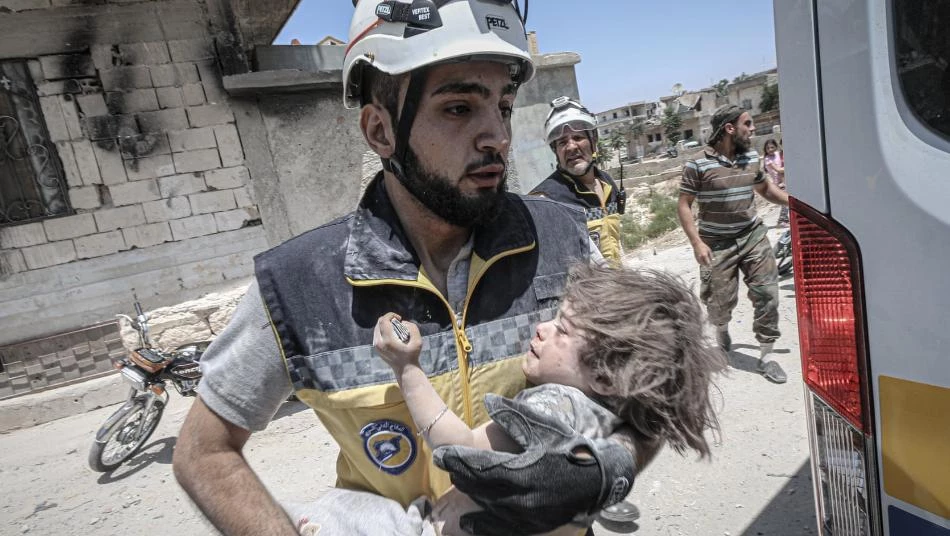Murdered children are no longer news. International media coverage of the war in Afghanistan, where child deaths reached an all-time high last year, is sporadic at best. In Yemen it is estimated that at least 85,000 under-fives have died of starvation since 2015, a figure that numbs the mind. In Syria, especially, it is hard to keep count because children are being killed almost every day – and who is really counting?
Harrowing images briefly capture public attention. One of the more recent showed five-year-old Riham struggling amid the rubble of her bombed home in Ariha, in Syria’s north-western Idlib province, to save her baby sister, Tuqa. Riham died later in hospital along with her mother and another sister. Thanks to her efforts, and White Helmet rescuers, Tuqa survived.

But the following day, at least another 10 civilians, including three children, were killed in air raids on villages and towns in opposition-held areas of Idlib, Aleppo and Hama. According to Save the Children, more children have been killed in the past month than in the whole of 2018. Monitors say there have been 800 deaths since the Assad regime’s Russian-backed offensive in Idlib began in April, 200 of them children. Most of these murders were not captured on video.
There are more comfortable ways to describe child deaths. The word “casualty” suggests the killings might even be accidental. But murder is what it is, and what it should be called. These are war crimes and crimes against humanity, ultimately carried out at the behest of two leaders – Syria’s Bashar Assad and Russia’s Vladimir Putin – who must one day face justice, or else international law is meaningless. “Intentional attacks against civilians are war crimes, and those who have ordered them or carried them out are criminally responsible for their actions,” Michelle Bachelet, the UN’s human rights chief, declared last week. Earlier in Syria’s eight-year war, she said, the world had shown considerable concern. “Now, airstrikes kill and maim significant numbers of civilians several times a week and the response seems to be a collective shrug.”
The Russian and Assad regime leaders deny that they are deliberately targeting civilians. They lie, just as they repeatedly lied about chemical weapons attacks. Accumulating evidence from the past three months points to a premeditated policy of pulverising Idlib’s civilian population in order to isolate and root out rebels and jihadists.
In a tactic previously used around Damascus and in Aleppo city, dozens of hospitals, clinics, schools, markets and public places in Idlib have been bombed. “The violence has escalated over the past month, leading to more people killed or wounded than at any time so far this year,” Doctors Without Borders reported last week. “Bombing and shelling ... has forced more than 450,000 people to flee north,” the charity said.
Now a new refugee crisis looms as displaced families head for Turkey and, perhaps, Europe and the UK. Governments may soon be forced to pay closer attention.
The western allies insist they are desperately concerned about Syria’s civilians. But at a security council meeting last week Mark Lowcock, the UN’s chief aid and emergency relief coordinator, lambasted them (and Russia and China) for “doing nothing for 90 days as the carnage continues in front of your eyes”. Were they finally prepared, he asked, “to listen to the children of Idlib?”
The answer Lowcock got was not the one he wanted. In a bid to bypass the usual Russian veto, a majority of council members prevailed on the UN secretary-general to launch an inquiry into the destruction of Idlib’s hospitals and other UN-supported facilities. But, like similar inquiries, it will probably be boycotted by the regime and its findings ignored. Of urgent, forceful action to stop the killing there was none.
Possibly reacting to this storm of criticism, Assad’s regime, backed by Moscow, offered a limited truce on Friday, conditional on opposition forces quitting a buffer zone created last September and repeatedly violated by both sides. That’s a big ask. Ceasefires typically do not last long in Syria. Assad’s militias, unsuccessful so far in their bid to overrun Idlib, may simply want time to regroup.
The battle for Idlib goes to the heart of what governments on all sides really do care about: the future balance of power in Syria. A closely related issue, for example, is who controls post-ISIS areas of north-east Syria. US troops are still there, despite Donald Trump’s vow to withdraw them. So, too, are the Turks. US cooperation with Syrian Kurdish forces, whom Turkey regards as terrorists, has brought renewed threats of a Turkish military land grab east of the Euphrates, akin to last year’s operation in Afrin. Meanwhile, anti-refugee sentiment inside Turkey appears to be surging – another problem for fleeing Idlib residents.
Iranian regime, too, is jockeying for position. Its militias have reportedly sat out the Idlib offensive, but its support for Damascus is undiminished, as shown by its continuing oil deliveries to Syria’s Baniyas refinery. In June, offshore underwater pipelines there were blown up by mystery attackers, according to the Bellingcat investigatory website. This coincided with limpet mine attacks on tankers in the Gulf that were blamed on Iran (which denied involvement). And it shortly preceded Britain’s seizure, apparently on US orders, of a fullyloaded Iranian tanker off Gibraltar.
Is it possible Trump and his neighbourhood friends are more interested in pursuing their vendetta with Iran than saving saving Syrian children’s lives? The only-too-obvious answer to that question – a grim question of priorities – holds the key to the universally shaming, unfinished tragedy of Idlib.
By Simon Tisdall
Link to the original source of the Guardian



التعليقات (0)